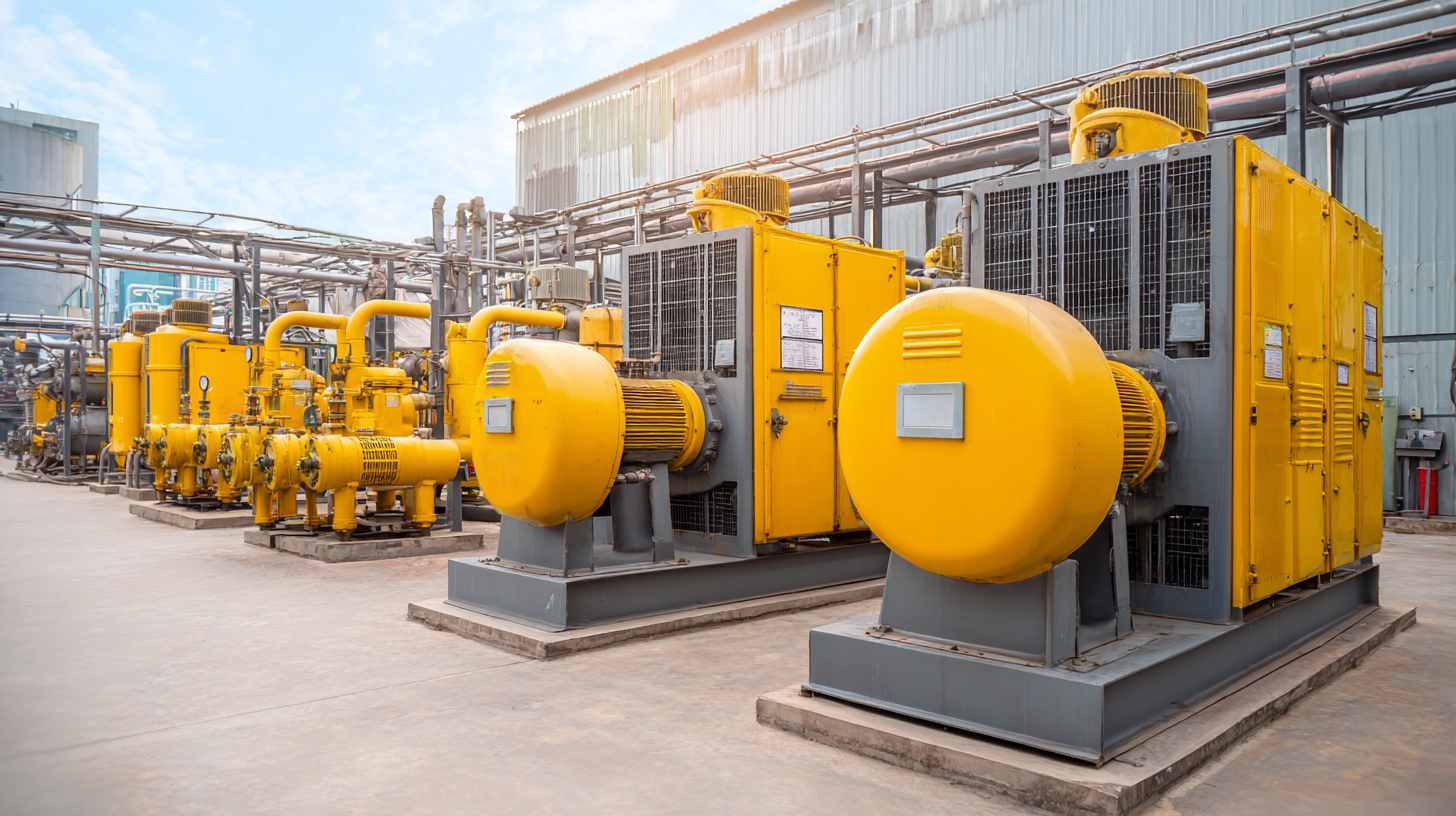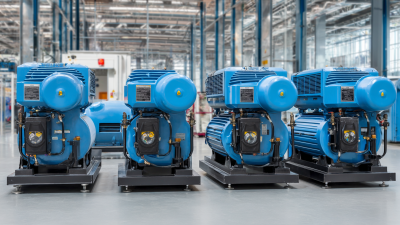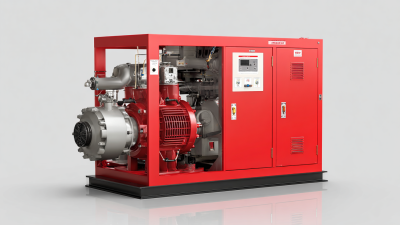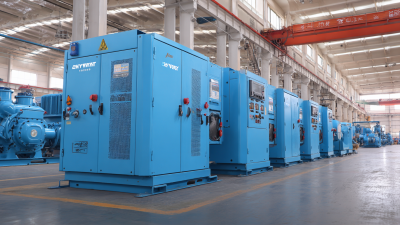7 Essential Tips to Maximize the Efficiency of Air Compressors in Your Operations
 In today's industrial landscape, air compressors play a critical role in enhancing operational efficiency across various sectors, from manufacturing to construction. According to a report by the U.S. Department of Energy, compressed air systems account for approximately 10% of the total industrial energy use in the United States, highlighting their significance in energy consumption and operational performance.
Properly maintained and optimized air compressors can reduce energy costs by up to 30%, ensuring that businesses remain competitive while also minimizing their environmental impact. With the increasing reliance on compressed air for essential tasks, understanding how to maximize the efficiency of air compressors is paramount.
Implementing effective strategies not only facilitates improved productivity but also extends the lifespan of these vital machines. This guide presents seven essential tips that will help operations harness the full potential of air compressors, ensuring that they operate at peak efficiency and contribute to enhanced business outcomes.
In today's industrial landscape, air compressors play a critical role in enhancing operational efficiency across various sectors, from manufacturing to construction. According to a report by the U.S. Department of Energy, compressed air systems account for approximately 10% of the total industrial energy use in the United States, highlighting their significance in energy consumption and operational performance.
Properly maintained and optimized air compressors can reduce energy costs by up to 30%, ensuring that businesses remain competitive while also minimizing their environmental impact. With the increasing reliance on compressed air for essential tasks, understanding how to maximize the efficiency of air compressors is paramount.
Implementing effective strategies not only facilitates improved productivity but also extends the lifespan of these vital machines. This guide presents seven essential tips that will help operations harness the full potential of air compressors, ensuring that they operate at peak efficiency and contribute to enhanced business outcomes.
Importance of Regular Maintenance and Inspection for Air Compressors' Longevity
Regular maintenance and inspection of air compressors are crucial for ensuring their longevity and operational efficiency. Neglecting routine checks can lead to unforeseen breakdowns, which not only disrupt workflow but also incur significant repair costs. By scheduling regular maintenance, operators can identify potential problems early and address them before they escalate. This proactive approach not only extends the lifespan of the compressor but also enhances its performance, enabling it to operate at optimal levels.
Moreover, inspection of essential components—such as filters, hoses, and belts—plays a vital role in maintaining air quality and preventing contamination. Clean air is essential for efficient production processes, and regular maintenance ensures that the air compressor functions smoothly without introducing impurities. Implementing a comprehensive maintenance schedule, guided by manufacturer recommendations, helps to sustain the equipment's efficiency and reliability over time. Ultimately, prioritizing regular maintenance and inspections can result in significant cost savings and improved operational productivity.
7 Essential Tips to Maximize the Efficiency of Air Compressors in Your Operations
| Tip Number | Tip Description | Importance | Frequency of Maintenance |
|---|---|---|---|
| 1 | Regularly check air filters | Ensures clean air intake | Monthly |
| 2 | Inspect belts for wear | Prevents unexpected breakdowns | Quarterly |
| 3 | Drain moisture from tanks | Prevents corrosion | Weekly |
| 4 | Check oil levels in compressors | Ensures proper lubrication | Every 500 hours of operation |
| 5 | Monitor operating temperature | Prevents overheating | Daily |
| 6 | Inspect hoses and fittings | Identifies leaks | Monthly |
| 7 | Schedule professional inspections | Ensures compliance and efficiency | Annually |
Understanding Compressor Load Management to Optimize Performance and Efficiency
Effective compressor load management is crucial for optimizing the performance and efficiency of air compressors in various operations. Understanding how your system responds to load variations allows operators to maintain optimal pressure levels and reduce unnecessary energy consumption. By implementing a control strategy that considers peak and off-peak demands, facilities can achieve significant savings and prolong the lifespan of their equipment.
One key approach to load management is the use of variable speed drives (VSDs). These allow compressors to adjust their speed based on the demand for compressed air, meaning they do not need to operate at full capacity all the time. Additionally, regular maintenance of the compressors ensures they run at peak efficiency, minimizing downtime caused by wear and tear. Monitoring data trends over time can also help identify patterns in air usage, enabling proactive adjustments to compressor settings, which contribute to overall operational efficiency.
The Role of Air Quality Control in Enhancing Compressor Efficiency
Maintaining high air quality is essential for optimizing the efficiency of air compressors. Contaminants such as moisture, dust, and oil can significantly impair compressor performance, leading to energy waste and increased operational costs. Implementing effective air quality control measures not only enhances the longevity of the equipment but also ensures it operates at its maximum efficiency. Regularly checking for leaks and using filters can help maintain clean air and improve overall system reliability.

Incorporating proper maintenance routines is crucial. Give attention to your compressor’s air intake system. A clean air filter is vital for preventing foreign particles from entering the system. Additionally, consider using dryers to manage moisture levels in the compressed air. Another tip is to routinely monitor air quality parameters to identify potential issues before they escalate. By prioritizing these aspects, operators can ensure their air compressors function smoothly and effectively without unnecessary downtime.
Implementing Energy-Efficient Practices to Reduce Operating Costs and Carbon Footprint
 Implementing energy-efficient practices in air compressor operations is crucial not only for reducing operating costs but also for minimizing environmental impact. One effective strategy is to regularly maintain compressors to ensure optimal performance. Regular checks for leaks, replacing worn-out parts, and performing scheduled maintenance can significantly decrease energy consumption, leading to lower electricity bills and a reduced carbon footprint.
Implementing energy-efficient practices in air compressor operations is crucial not only for reducing operating costs but also for minimizing environmental impact. One effective strategy is to regularly maintain compressors to ensure optimal performance. Regular checks for leaks, replacing worn-out parts, and performing scheduled maintenance can significantly decrease energy consumption, leading to lower electricity bills and a reduced carbon footprint.
Additionally, utilizing variable speed drive (VSD) technology can enhance efficiency by adjusting the compressor’s output to match the demand precisely. This adaptability helps prevent unnecessary energy expenditure during off-peak hours. Furthermore, investing in an energy management system can provide real-time monitoring and analysis of energy usage, enabling operations to make informed decisions and identify areas for improvement. By prioritizing these energy-efficient practices, businesses can achieve substantial savings while contributing to a more sustainable operational model.
Technological Upgrades and Innovations to Boost Compressor Performance in Operations
As the air compressor control systems market is projected to grow from $530 million in 2022 to $870 million by 2030, enhancing the efficiency of air compressors through technological upgrades has become increasingly critical for operational success. Innovations in controller technologies not only optimize performance but also improve energy efficiency, minimizing operational costs. Industries can benefit from adopting advanced digital controllers that provide real-time monitoring and predictive maintenance capabilities, thus reducing downtime and enhancing productivity.
Furthermore, emerging trends in portable air and gas compressors highlight the importance of adaptability in operations. The projected growth in this segment underscores the demand for versatile equipment that can perform under various conditions. By integrating smart technologies, such as IoT connectivity and automation systems, companies can significantly improve the responsiveness of their operations. Such technological advancements not only support sustainable practices by reducing energy consumption but also pave the way for the development of more efficient compressed air systems essential for the future of manufacturing and industrial applications.
Air Compressor Efficiency Metrics
This bar chart illustrates the monthly average efficiency metrics of air compressors, showcasing energy consumption, air output, maintenance costs, operating pressure, and runtime efficiency. These metrics are essential for identifying areas of improvement and maximizing compressor performance in operations.
Related Posts
-

7 Essential Tips for Sourcing High-Efficiency Air Compressors: Maximize Your ROI!
-

7 Essential Tips for Choosing the Right Air Compressors for Your Business
-

Choosing Top Quality Manufacturers for Best Industrial Compressors
-

2025 Industry Trends: Innovative Solutions for the Best Air Compressor Empowering Your Business
-

Unlocking Efficiency: The Advantages of Choosing Industrial Compressors for Your Business
-

Global Export Powerhouse Producing the Finest Rotary Screw Air Compressors from China


